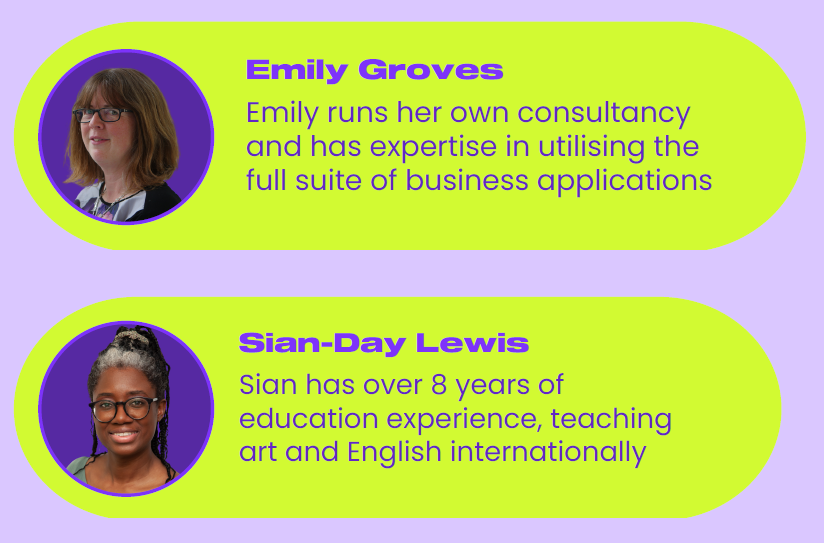Read our latest brochure
A ROADMAP TO EMPOWER REFUGEES AND BUILD YOUR TALENT PIPELINE
Click on the brochure to download it
Many thanks to the following for making our first Ukrainian Digital Empowerment course possible Thank you to Marise at Scottish Power Thank you to Nick at Avant Assessment Thank you to Neil at Blatant Thank you to Irfan at Istech Solutions Thank you to the Clutha Trust
All our courses now have business english resources as well as AI translation support
Check out our Current Courses
A ROADMAP TO EMPOWER REFUGEES AND BUILD YOUR TALENT PIPELINE
Click on the brochure to download it
At present there are over 24000 displaced Ukrainians in Scotland, 81% of
whom are women.
Currently most of this community are living in social housing and nearly 6000 in
temporary
accommodation deemed ‘unsuitable’ by a recent Red
Cross Report. Just under 80% of this community are educated to degree
level with many having
previous work experience in professional roles and possess the digital skills sought by Scottish employers.
Yet the majority are unemployed or underemployed and remain dependents on benefits. Unable to overcome major
obstacles we are effectively
these skilled refugees from work, at the same time we know the positive
contributions these individuals can make (Ukrainian
Refugees impact: Scottish Govt). This means that many
Ukrainians are facing homelessness and an increasingly hostile environment surrounding the cost
of housing
refugees and a UK Government now proposing the Refugee
Ban Bill.
There is still no long-term
housing
plan
for over 1000 Ukrainians currently on the MS Ambition which again would result in individual families
scattered throughout Scotland in alternative temporary accommodation.
Training
Book our specialist training and consultancy services. Profits go to supporting this program.
Time
Offer your valuable time & knowledge, provide industry talks or volunteer to help.
Sponsorship
Your organisation could sponsor a new course or sponsor individual learners.
Practical
We need laptops/PCs/lunches to help run the program again.
Job Opportunities
Consider learners for jobs in your organisation.
To find out more and how you can help, contact:
digitalempowerment@codedivision.co.uk
Our team of experts utilised the foundations of design thinking in the process of building our Women Returners program
A 5-week face-to-face training program for 29 Ukrainians funded by the Women Returner Program providing SQA Data Analysis qualifications and developing skills in Communication, Collaboration, Critical, and Creative Thinking.
Program lead, Bianca Peel, with her background in social emotional learning, infused design thinking into the program which was delivered alongside Sian-Day Lewis and Emily Fais, teaching Data Skills and Business English respectively.
Design thinking's human-centric approach promotes a safe learning environment, leading to an increase in confidence, self-awareness, and productivity.
To prepare learners for digital roles within budget and time constraints, with the ability to secure employment and effectively communicate their value to the company.
Bianca's team created a program promoting innovative, empathetic problem-solving skills through diverse and imaginative thinking, equipping learners with the knowledge required to succeed in their careers.
To remain flexible for various language abilities and life circumstances, the Women Returners program underwent changes and improvements over five weeks, which were evaluated through Avant Assessment (Business English) and SQA (Data Skills).
The program underwent continual refinement throughout, based on regular feedback from learners and employers, in an iterative process of extensive testing and adaptation.
Scottish Power developed the program to help returners refresh their existing skills and knowledge while building their confidence in a working environment through a structured pathway.
The brilliant news is that 3 of our learners (Anastasiia, Maryna and Alona) are now successfully on the program and working for Scottish Power.

Thanks to funding from our partners at the Data Lab, we were able to design and deliver an additional 3-week SQA accredited course for Ukrainian learners in the South East of Scotland.
The course was designed to help support learners into a variety of digital roles, concentrating on essential Business English and Data Analysis skills on how to utilise business applications to improve productivity within a variety of professional roles.
We connected with the DWP and third sector organisations in Fife, the Lothians, Ayrshire, and the Borders as well as travelling to meet communities of displaced Ukrainians on the cruise ships MS Victoria and MS Ambition.

This engagement helped shape the design and delivery of our shorter specialist courses in Digital Marketing, Adobe Photoshop and ITA funded: Introduction to Python and Java. We welcomed Ukrainians to join learners from all over Scotland to upskill in these courses.

We are determined to support our learners into good jobs that will give them the best chance of a fair start.
Organisations need to collaborate in identifying solutions to this unfolding crisis.
Over the last 8 months we have worked closely with the Ukrainian community in Glasgow and hubs
throughout Scotland. We delivered a successful learner centered program that combined trauma informed
learning, Business English, 4Cs training and digital skills. We were also able to offer short digital
upskilling courses but although we have a proven track record, we are no longer able to offer these
programs as there is no longer the funding.
To get in touch with our team, please email:
digitalempowerment@codedivision.co.uk
The first step is engagement to initiate collaboration between organisations. Explore ways to reframe the problem, start to ideate solutions and iterate towards better answers.
These programs need funding. Organisations can support this through sponsorship, community benefits money or indirectly by booking training with us.
We need to design flexible and inclusive programs that are people-centred. Working on program design together organisations can ensure these are tailored to meet their skills shortages.
Corporate and community support we receive makes all the difference. You could support through mentoring, workshops, providing work experience (internships) and to contribute to program delivery.
Our end goal is to support learners with good quality jobs. That could be offering them positions directly or adapting existing programs to be more flexible (Returner, Apprenticeships or Graduate).